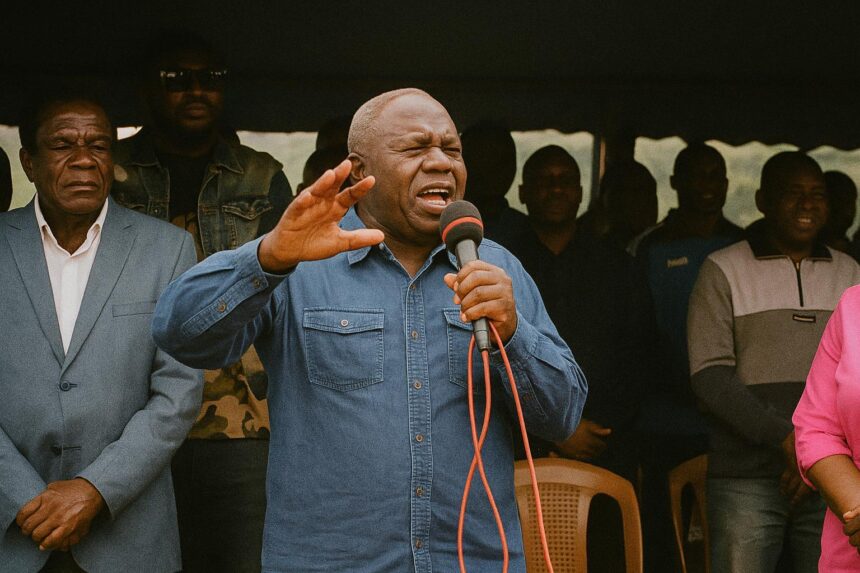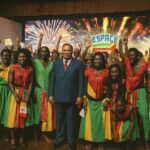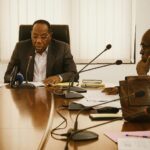Announcement in Kinkala Resonates Beyond the Pool
The dusty esplanade of Kinkala’s bus station rarely hosts moments of national consequence, yet last Saturday it became the theatre of an unmistakable political signal. Before a visibly enthusiastic crowd, Frédéric Bintsamou—better known by the sobriquet Pasteur Ntumi—formally declared his candidacy for Congo-Brazzaville’s 2026 presidential election. “No election will henceforth take place without the CNR,” he proclaimed, invoking the party he created in 2022, the Conseil National des Républicains. The speech marked the culmination of a months-long membership drive that, according to organisers, has brought several thousand new adherents into the party’s fold (local press reports, 2024).
The immediate reactions ranged from curiosity in Brazzaville’s diplomatic quarter to guarded optimism among youth groups in the Pool, a department historically affected by cyclical unrest. Observers noted that the event unfolded peacefully under the watch of local authorities, illustrating the state’s continued commitment to safeguarding civic space while preserving hard-won stability.
From Rebel Command to Civic Contestation
Ntumi’s trajectory from insurgent leader of the Ninjas militia to aspirant for the highest office is emblematic of Congo’s complex reconciliation architecture. During the 2016-2017 hostilities—an episode that displaced approximately 300 000 citizens according to humanitarian estimates—the former pastor commanded significant leverage over rural strongholds, challenging the legitimacy of President Denis Sassou Nguesso’s re-election (Amnesty International, 2018).
Yet the cessation of fighting in December 2017 and the subsequent agreements have progressively normalised Ntumi’s status. The government’s Disarmament, Demobilisation and Reintegration programme, supported by the World Bank, extended olive branches that were reciprocated in 2019 when the ex-rebel publicly laid down arms and accepted a rural development advisory role. Political scientists at Marien-Ngouabi University often cite this inclusion as a textbook case of converting non-state actors into constitutional stakeholders.
Government Consolidation of Peace Gains
Brazzaville’s executive has since prioritised infrastructure rehabilitation in the Pool, reopening the Chemin de Fer Congo-Océan line and refurbishing primary clinics. These initiatives, backed by an oil-supported fiscal recovery, have been welcomed by international partners who see them as essential to preventing relapse (African Development Bank, 2023). The administration’s measured facilitation of Saturday’s gathering underscores its confidence in institutional mechanisms and its willingness to accommodate a plural political spectrum.
Senior officials contacted after the rally emphasised that “all legally constituted parties are free to campaign, provided they respect the republican framework.” Such remarks reinforce the government’s narrative that stability and openness are no longer mutually exclusive but rather interdependent pillars of the nation-building project.
Electoral Arithmetic in the Run-Up to 2026
With nearly two years remaining, it is premature to quantify Ntumi’s electoral weight. The Pool accounts for roughly six percent of the national electorate, and early polls suggest that the incumbent Congolese Labour Party retains a robust base in urban centres such as Brazzaville and Pointe-Noire (Centre d’Analyse des Politiques Publiques, 2024). Yet Ntumi’s candidacy could resonate among younger voters seeking generational rotation, as hinted by his exhortation: “The future of Congo begins with you.”
Diplomats note that the 2026 race will unfold under a revised electoral code that introduces biometric voter identification and streamlines dispute resolution. These reforms, enacted in 2023 after broad consultations with opposition groups and civil society, are expected to enhance credibility and reduce post-electoral litigation. In that context, Ntumi’s transition from extra-legal protest to ballot-box competition may serve as a litmus test for the reforms’ inclusivity.
Regional Optics and International Engagement
Congo-Brazzaville’s stability carries weight well beyond its borders, given its pivotal role in the Congo Basin’s climate agenda and trans-border security networks. The Economic Community of Central African States has repeatedly lauded Brazzaville’s mediation efforts in regional crises, most recently in Chad. Ntumi’s peaceful reinsertion reinforces the country’s reputation as a laboratory for pragmatic conflict resolution, a view echoed by the UN Office for Central Africa in its December 2023 briefing to the Security Council.
Foreign investors monitoring maritime exports through Pointe-Noire port are likewise attentive. They generally welcome any signal that consolidates public order, viewing an orderly multiparty race as complementary to sovereign credit metrics. For diplomatic missions, the primary concern remains voter education and logistical preparedness, areas in which Brazzaville has historically cooperated with partners such as the European Union and the International Organisation of La Francophonie.
Long-Term Outlook for National Cohesion
Ultimately, Ntumi’s declaration underscores how far Congo-Brazzaville has travelled since the dark days of internecine strife. The government’s calibrated response—neither obstructive nor complacent—suggests confidence in the resilience of republican institutions nurtured over the past decade. Whether the former rebel can translate local charisma into nationwide endorsement remains uncertain, but his willingness to pursue change through constitutional channels already marks a qualitative shift in the political culture.
For the diplomatic community, the coming months will be an exercise in quiet observation: assessing the maturation of political parties, the neutrality of administrative bodies and the tenor of public debate. Against that backdrop, the 2026 election has the potential to consolidate Congo’s peace dividend, provided all stakeholders maintain the current trajectory of dialogue, restraint and developmental focus.





















